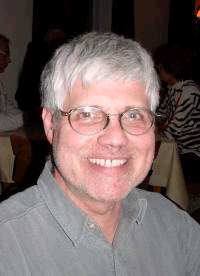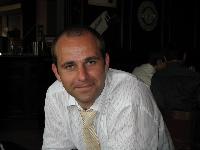Again the old topic: Specialization Thread poster: Annett Hieber
|
|---|
Dear All,
I hope I don't bore you by bringing up that topic again. Although I'm already some time in the business and, of course, have my special fields in which I do most of my work, I would like to take on another specialty.
Until now, most of my working and interest fields devoloped more or less accidentally (by companies I know who asked me years ago to do translations for them, or by accumulating knowledge in several areas I got to know when I worked as an employe... See more Dear All,
I hope I don't bore you by bringing up that topic again. Although I'm already some time in the business and, of course, have my special fields in which I do most of my work, I would like to take on another specialty.
Until now, most of my working and interest fields devoloped more or less accidentally (by companies I know who asked me years ago to do translations for them, or by accumulating knowledge in several areas I got to know when I worked as an employee).
Now, because I would like to work more in fields in which I'm personally more interested, I don't know what exactly to choose and how to start. Unfortunately, I don't have a special education like engineering or other.
I would be very glad, if you could write me about your experiences regarding the questions why you chose this or that and how you developed the necessary skills or knowledge.
I'm very keen on receiving your opinions! Thank you very much in advance for participating in this discussion.
By the way, I hope I chose the right forum...
Annett ▲ Collapse
| | | | | You seem to have plenty of fields listed there already | Jan 24, 2009 |
My suggestion would be to specialise to a greater extent in one or two of these fields, collect terminology, develop termbases, and so on, so that you are equipped to do absolutely anything in those fields. If you really work on developing translation memories and termbases in one or two select areas you will also have the advantage of gradually being able to do the work faster in these areas (while maintaining accuracy), which will increase your earnings.
Perhaps if you have not ga... See more My suggestion would be to specialise to a greater extent in one or two of these fields, collect terminology, develop termbases, and so on, so that you are equipped to do absolutely anything in those fields. If you really work on developing translation memories and termbases in one or two select areas you will also have the advantage of gradually being able to do the work faster in these areas (while maintaining accuracy), which will increase your earnings.
Perhaps if you have not gained experience in those fields which are interesting to you, you might drop them and develop the ones that are interesting to you instead. This would motivate you a little bit more to develop your expertise, as mentioned above.
If you do not know which fields to choose, then you had better make a decision, and simply pick something interesting to you that you could develop.
How you develop the necessary skills and knowledge is by reading articles on the subject in both languages, and by spending weekends creating useful termbases.
Good luck!
Astrid ▲ Collapse
| | | | | Another approach | Jan 24, 2009 |
Termbases? Not for me!
I don't translate medicine, period. Though I can often tell head from toes, I know too little about what's in-between them, and especially how that works, to understand any medical text in any language.
So if I had the world's most comprehensive medical termbase, at best it would turn me into an automated medical translation machine, not a specialized translator.
IMHO a translator must fully understand the ideas of whoever wrot... See more Termbases? Not for me!
I don't translate medicine, period. Though I can often tell head from toes, I know too little about what's in-between them, and especially how that works, to understand any medical text in any language.
So if I had the world's most comprehensive medical termbase, at best it would turn me into an automated medical translation machine, not a specialized translator.
IMHO a translator must fully understand the ideas of whoever wrote the source text, and properly convey them in the language and culture of the target language. Otherwise it gets too close to machine translation.
So one way to specialize in an area of knowledge is to read! read! read! about in both source and target languages, striving to learn as much as possible about that without having to actually do it. Okay, you can't learn to swim from reading a book, but you can learn how people write about it.
To keep motivation high to go on reading about it, it must be an area that interests you. If you think it's dull, you'll quickly drop it.
To illustrate, a friend (who speaks PT, and some limited EN) asked me for help in translating some knitting recipes (?) from Italian into Portuguese. Though I speak Italian, I don't translate it professionally. Nevertheless, it was quite an interesting experience to learn how people convert the instructions for doing the various steps in knitting into concise text. Of course, I had to use that friend's knitting knowledge. As I explained her what the words meant in Italian, she came up with the Brazilian way of saying that. I didn't learn how to knit from that experience, but got a general understanding on how to explain it's done, both in Italian and Portuguese.
Of course, one week later I had already forgotten all of it, as I won't be an IT>PT translator, nor specialize in knitting! But I could... ▲ Collapse
| | | | | Termbases have many uses | Jan 24, 2009 |
José Henrique Lamensdorf wrote:
Termbases? Not for me!
I don't translate medicine, period. Though I can often tell head from toes, I know too little about what's in-between them, and especially how that works, to understand any medical text in any language.
So if I had the world's most comprehensive medical termbase, at best it would turn me into an automated medical translation machine, not a specialized translator.
I wouldn't waste my time in a field beyond my interests and skills, but I see considerable value in building termbases for my own special fields or ones which are closely related.
One of my favorite specialties is document management software. I've lost track of how many companies I have served directly or through agencies in this field. Every time I try to make a list, later I remember more that I forgot to add. I can do those translations in my sleep, even faster than chemistry translations in the fields I used to do research in.
However, many of these software providers have their own specific terms in English where the German source terms are the same. My memory is still fairly good despite my advanced age, but it's not good enough to keep all the variations for these different clients straight all the time. Nor can I use automated QA tools for checking terminology compliance in my CAT environment unless I go to the trouble of compiling these termbases.
In the CAT tool I use most, Déjà Vu X, these termbases can be used to assemble suggested translations or fragments of translations. Often this saves me a great deal of time or improves consistency and quality.
I also use some termbases shamelessly as marketing tools. New clients often get glossaries returned with their projects as a little "extra". In fields I work in frequently, the content of these glossaries is often drawn from existing databases released for general use and very little extra manual work is involved on my part.
So I agree with you that it's a waste of time to make termbases for their own sake - or to collect dictionaries in fields that are utterly beyond your grasp. I make the sign of the cross every time I walk past my partner's dictionaries for the fashion industry, because I could never understand or appreciate that stuff in this lifetime.
| | |
|
|
|
Nicole Schnell 
United States
Local time: 22:14
English to German
+ ...
In memoriam | A case study | Jan 24, 2009 |
A couple of years ago, I wouldn't have touched IT with a 10 foot-pole. One client of mine however insisted on training me - easy texts at first, then more technical ones, then really serious stuff - today I am localizing software for SAP, industrial machines and g3 web applications.
| | | | John Jory 
Germany
Local time: 07:14
English to German
+ ...
| How much time do you have? | Jan 24, 2009 |
As José Enrique suggests, getting hold of and reading as much literature as possible on the subject is a good start. Practically every profession/technology/trade etc. has at least one corresponding trade journal. They mostly have interesting feature articles about new developments, materials, processes. If you don't have the necessary background knowledge to understand the articles, you might be able to find it in Wikipedia or similar online sources.
You could also check the websi... See more As José Enrique suggests, getting hold of and reading as much literature as possible on the subject is a good start. Practically every profession/technology/trade etc. has at least one corresponding trade journal. They mostly have interesting feature articles about new developments, materials, processes. If you don't have the necessary background knowledge to understand the articles, you might be able to find it in Wikipedia or similar online sources.
You could also check the websites of manufacturers/suppliers of the subject you are interested in. Many of them provide application reports, brochures, data sheets, etc.
Both of the above suggestions would at least give you an idea of the overall scope of the field, and help you decide whether it's what you would like to get your teeth into.
In principle, that's how I got specialized in plastics processing. Meanwhile, I translate 1 or 2 feature articles per month for the English edition of a major German plastics journal. I really enjoy it, because it keeps me informed on the latest developments. Of course, it sometimes also involves quite a bit of research, if the field is new to me.
Have fun
[Edited at 2009-01-24 17:31 GMT] ▲ Collapse
| | | |
It may sound like a very classical and dusty approach, but I find that reading books on the subject you want to be (or are) specialized in is a great way to succeed, in my opinion.
Incidentally, even though I do not translate in the medical field, I have a plethora of medical text books from university. Although I do not intend to translate in that field, it is one that I take personal interest in (I like science in general). I read these books once in a while - right now, I read Ha... See more It may sound like a very classical and dusty approach, but I find that reading books on the subject you want to be (or are) specialized in is a great way to succeed, in my opinion.
Incidentally, even though I do not translate in the medical field, I have a plethora of medical text books from university. Although I do not intend to translate in that field, it is one that I take personal interest in (I like science in general). I read these books once in a while - right now, I read Harrison's Principles of Internal Medicine. I am not supposed to read it because it is a huge book that tells you about pretty much every medical condition and disease possible, but in a very brief and scientific style (not suitable for the nightstand). It is not intended for the general public. Since I've been reading such books, my understanding of medicine has greatly increased, even though I have no education in the field.
As for my main specialization, which is the environment, I subscribe to online trade publications and read a bit of that each day at the end of the day. It keeps me up to date on new technology, environmental projects being undertaken throughout the world, scientific development, etc., but most importantly, by reading up on the subject every day, I get an understanding of how things work in the field.
I believe the reason why this method works for me is because these fields are fields that I like, that I am often passionate about. I am reading up on things I want to know - it's a pleasure. So, as long as you are genuinely interested in a topic, not just out of financial interest, then you are most likely going to learn a lot and be able to retain the knowledge. Of course, if you only read up on subjects because they are your specializations and you otherwise couldn't care less about them, that's a different matter.
If you would like to investigate books that will help you gain a good understanding of a field, then go for books used to teach that field in university. Pretty much all books that have the word 'principles' in their titles are good for this purpose. Don't go for books that are highly specialized in one specific topic within the broader field - you will get bored, will not finish the book and will not remember what you have learned.
Since such textbooks usually cost a small fortune, try to get some at the library first, read them a bit, and see if you are interested in reading the whole thing. If you are, then don't hesitate to invest in them. You will most likely want to look things up in them as you translate.
[Edited at 2009-01-24 19:17 GMT] ▲ Collapse
| | | | | Cart before the horse? | Jan 24, 2009 |
The specialized translators I know started by learning about the subject and then becoming specialized translators in it. Their clients choose them for that field because they know about it. So the way I would go about it is if, say, you're interested in becoming an expert in coal mining translations, going to VHS classes on the subject, reading books about the subject, and then saying on your resume that you have this training in the art of mining coal. You also do some networking to make sure ... See more The specialized translators I know started by learning about the subject and then becoming specialized translators in it. Their clients choose them for that field because they know about it. So the way I would go about it is if, say, you're interested in becoming an expert in coal mining translations, going to VHS classes on the subject, reading books about the subject, and then saying on your resume that you have this training in the art of mining coal. You also do some networking to make sure you keep up with the latest developments on the subject.
Ms. Gimbe mentioned buying books. One thing you might do is visit flea markets or charity sales and look through the books on offer. When I was stationed in Germany, I got books this way for a mark or two, looked through them, kept them if I thought they'd be useful, and gave them to another charitable organization if I didn't. I do that here in the US as well. I have a lot of books on a lot of subjects I acquired that way. (One of the books on my bookshelf is "Aktuelle Fragen der Entwicklung von DDR Recht". Obviously, these issues aren't all that current any more, but it's still useful, and the book only cost me 50 cents US.)
That said, you may not be a specialist translator in coal mining but that doesn't stop the authors of your source text from discussing the subject in documents that are primarily about something else. I specialize in legal documents, but the lawyers do not discuss only legal issues. There are often issues of fact in lawsuits, and, even if there aren't, the legal arguments may hinge on the facts. So I will find in my legal documents discussions of manufacturing processes, financial affairs, the history of Germany and various other subjects that wouldn't normally be considered "legal". ▲ Collapse
| | |
|
|
|
Annett Hieber 
Germany
Local time: 07:14
English to German
+ ...
TOPIC STARTER | Thanks a lot! | Jan 26, 2009 |
Thank you all very much for giving me your advice and different opinions. It's very interesting for me and I think I now know what to do and how to do it.
It was very motivating and I hope that your comments will also help others to make the right decisions!
Annett
| | | | Martin Stranak 
Czech Republic
Local time: 07:14
English to Czech
+ ...
| Tricky issue forever | Jan 26, 2009 |
Being in this business for seven years now, I encountered various discrepancies in the field I do, mostly the technical and military stuff. Yet one might even receive medicine or legal, which is easy peazy, apart from apparently simple material expressed in such terms the Guiness Book of Records might work into a funny bookmark
| | | | To report site rules violations or get help, contact a site moderator: You can also contact site staff by submitting a support request » Again the old topic: Specialization | CafeTran Espresso | You've never met a CAT tool this clever!
Translate faster & easier, using a sophisticated CAT tool built by a translator / developer.
Accept jobs from clients who use Trados, MemoQ, Wordfast & major CAT tools.
Download and start using CafeTran Espresso -- for free
Buy now! » |
| | TM-Town | Manage your TMs and Terms ... and boost your translation business
Are you ready for something fresh in the industry? TM-Town is a unique new site for you -- the freelance translator -- to store, manage and share translation memories (TMs) and glossaries...and potentially meet new clients on the basis of your prior work.
More info » |
|
| | | | X Sign in to your ProZ.com account... | | | | | |












